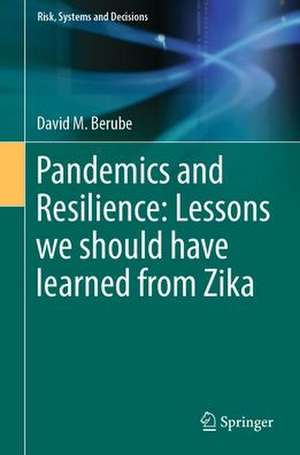Pandemics and Resilience: Lessons we should have learned from Zika: Risk, Systems and Decisions
Autor David M. Berubeen Limba Engleză Hardback – 6 mai 2023
This book examines the technical literature, digital and popular literature, and online materials to fully contextualize this event and provide a bona fide record of this event and its implications for the future. It is somewhat serendipitous that while this work was underway, we are going through another pandemic. One of the primary lessons we did not learn by Zika was pandemic events will return repeatedly, and we need to learn from each one of them to prepare the planet for the next one. Just because Zika seemed to have died out does not make it less important. We were lucky that thevirus evolved into what seemed to be a less virulent version of itself, and the vector mosquitoes were concentrated elsewhere. Finally, this book represents a tour de force in scholarship involving nearly 4,000 sources of information and does not shy from a detailed examination of the controversies, conspiracies, and long-term consequences when we avoid learning from outbreaks, such as Zika.
| Toate formatele și edițiile | Preț | Express |
|---|---|---|
| Paperback (1) | 862.45 lei 39-44 zile | |
| Springer International Publishing – 23 mai 2024 | 862.45 lei 39-44 zile | |
| Hardback (1) | 1031.80 lei 3-5 săpt. | |
| Springer International Publishing – 6 mai 2023 | 1031.80 lei 3-5 săpt. |
Preț: 1031.80 lei
Preț vechi: 1258.30 lei
-18% Nou
Puncte Express: 1548
Preț estimativ în valută:
197.49€ • 205.39$ • 165.49£
197.49€ • 205.39$ • 165.49£
Carte disponibilă
Livrare economică 20 februarie-06 martie
Preluare comenzi: 021 569.72.76
Specificații
ISBN-13: 9783031253690
ISBN-10: 3031253698
Pagini: 634
Ilustrații: XXXIII, 634 p. 23 illus., 20 illus. in color.
Dimensiuni: 155 x 235 mm
Greutate: 1.36 kg
Ediția:2023
Editura: Springer International Publishing
Colecția Springer
Seria Risk, Systems and Decisions
Locul publicării:Cham, Switzerland
ISBN-10: 3031253698
Pagini: 634
Ilustrații: XXXIII, 634 p. 23 illus., 20 illus. in color.
Dimensiuni: 155 x 235 mm
Greutate: 1.36 kg
Ediția:2023
Editura: Springer International Publishing
Colecția Springer
Seria Risk, Systems and Decisions
Locul publicării:Cham, Switzerland
Cuprins
1. Why study Zika?.- 2. Pandemic events are communication events.- 3. Zika re-emerges..- 4. Zika ebbs.- 5. Convergence.- 6. Transmission.- 7. Effects on children, Part 1.- 8. Effects on children, Part 2.- 9. Effects on adults.- 10. Vectors and reservoirs management.
Textul de pe ultima copertă
The aim of the book was to produce the most comprehensive examination of a pandemic that has ever been attempted. By cataloging the full extent of the Zika pandemic, this book will be the most complete history and epistemic contextualization ever attempted to date. The work should function as the primary source for students, researchers, and scholars who need information about the Zika pandemic.
This book examines the technical literature, digital and popular literature, and online materials to fully contextualize this event and provide a bona fide record of this event and its implications for the future. It is somewhat serendipitous that while this work was underway, we are going through another pandemic. One of the primary lessons we did not learn by Zika was pandemic events will return repeatedly, and we need to learn from each one of them to prepare the planet for the next one. Just because Zika seemed to have died out does not make it less important. We were lucky that the virus evolved into what seemed to be a less virulent version of itself, and the vector mosquitoes were concentrated elsewhere. Finally, this book represents a tour de force in scholarship involving nearly 4,000 sources of information and does not shy from a detailed examination of the controversies, conspiracies, and long-term consequences when we avoid learning from outbreaks, such as Zika.
Caracteristici
Builds guidance for pandemic management to upgrade responses to infectious diseases Presents the most complete history and epistemic contextualization ever attempted to date Represents a tour de force in scholarship involving nearly 4,000 sources of information













